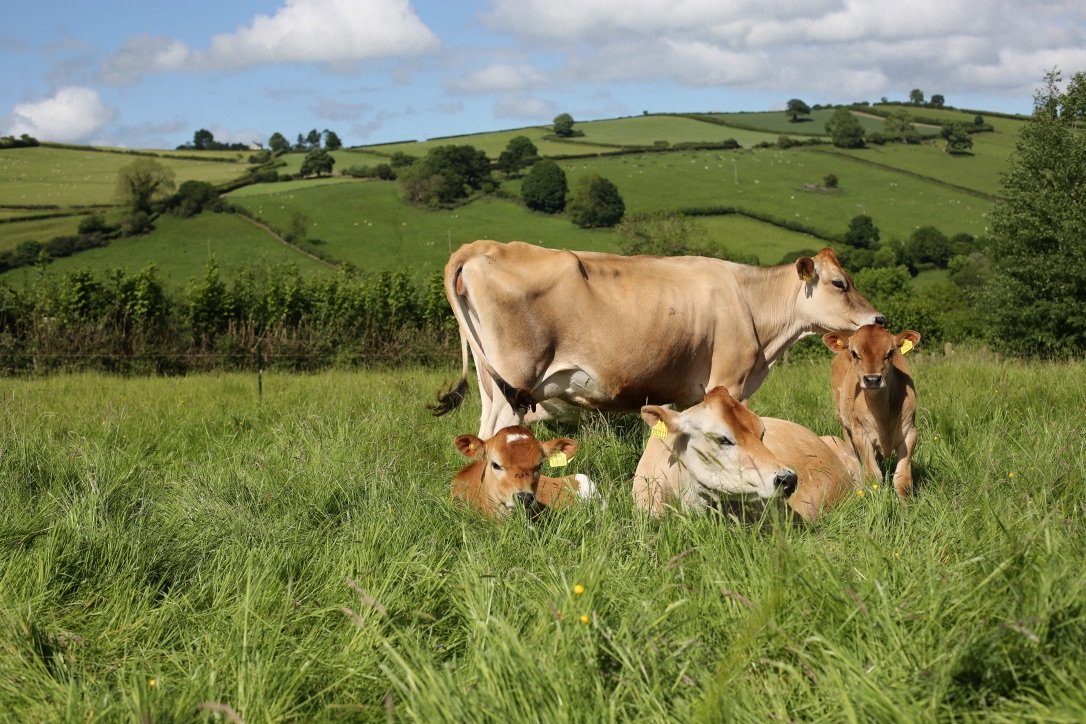
Farming Methods
We use a range of regenerative and sustainable farming methods to nurture nature’s soil food web below ground and to grow lush pasture above ground.
“We know more about the movement of celestial bodies than we do about the soil underfoot.”
— Leonardo da Vinci
Our farming aims are to foster the development of a vibrant environment that builds soil structure, makes nutrients available to plants and animals, provides delicious and highly nutritious food for people and supports diverse wildlife and natural fauna and flora. Our virtually closed-loop system is not only sustainable but regenerative and takes us beyond organic.

Wildflower Meadows
Wildflower meadows provide food and habitat for a wide diversity of flora and fauna as well as being a rich source of minerals and other nutrients for grazing cattle.
Wild flowers are decimated by artificial fertilisers, which promote the rapid growth of thug-like grasses that smother and squeeze out the native flowers. We farm organically at Smiling Tree and are fortunate to have some pastures where chemical fertilisers have not been used for over 20 years. In the summer, these fields are bursting with life including many species of solitary bees and bumblebees, birds searching for insects and voles, and other wildlife.
Grazed only lightly in the spring and then benefiting from our holistic practice of mob-grazing, the fields have plenty of time to flower and set seed. We stagger the timing of grazing in these fields to allow different plant species to benefit, keeping the breadth of diversity and offering the grazing animals nutritious food.
Fields of Herbs
We grow fields of a special selection of herbs to provide a nutritious salad bar buffet for our cattle to graze.
Animals have an innate sense of what food is good for them. They search out plants containing specific nutrients and natural plant chemicals that are both nutritious and beneficial to their health.
Our herbal pastures contain a range of many different plants, including yarrow, salad burnet, chicory, birdsfoot trefoil as well as several different clovers, each with its own specific qualities. Some, like sanfoin and sheeps parsley, are particularly deep-rooting and pull up minerals from deep down in the soil. Others, like chicory and plantain, have unique anthelmintic properties that naturally remove any parasites from the sheep and cattle.
The herbal pastures at Smiling Tree form an integral part of our farming practices that are designed to keep our animals vibrantly healthy and to give us highly nutritious meat and milk.

Mob Grazing
There’s an old saying, “Never leave the sheep in the same field long enough to hear the church bell ring twice”. In other words, move them every week.
Mob grazing is a modern version of this successful traditional farming practice and is one of the numerous sustainable farming methods we've introduced at Smiling Tree.
Using grazing animals to manage and encourage grass growth was common practice until the post-war industrialisation of agriculture saw thousands of miles of hedgerows removed and fields made bigger. It was replaced with artificial growth stimulants in the form of chemical fertilizers and ‘set stocking’, where a ‘set’ number of animals is left in a field for a long period of time, sometimes all year.
To appreciate the significant consequences of set stocking and the use of chemical fertilisers you need to know a little about soil science.
Domesticated cattle and sheep still retain the instincts of prey animals, which in the wild would move regularly as a bunched group to find fresh grazing and keep predators at a distance. ‘Mob grazing’ replicates this natural behaviour by grazing animals in relatively small areas for short periods. Moved to fresh pasture every day or so, they don’t return to the same grazing area for weeks or even months. Grazing grass in this way, as the old farmers knew, benefits not only the animals but also the health of the land, the wildlife and the wider ecosystem.
Read more in our mob grazing article.
Permanent & Silvo Pastures
Permanent pastures are a trove of diverse, native flora and fauna.
A 'permanent pasture' is officially defined as a field that has not been ploughed or otherwise mechanically cultivated for just 5 years. Many of the permanent pastures at Smiling Tree, however, have not been touched for over 20 years and some for much longer.
As a result, they contain a wide diversity of grasses and other herbaceous plants. The sward (covering of grass) is dense and thick, providing excellent soil protection and helping to prevent poaching by animals in wet weather. In addition, the pastures can hold a mixed cache of seeds for many years until the right conditions for germination occur.
We have planted many thousands of trees within our permanent pastures, to develop the woodland edge benefits of a silvo-pastoral system. These include shelter and shade for animals, as well as providing a variety of habitats for wildlife. Some trees will also provide fodder for the cattle and sheep, allowing them to browse the leaves that have both nutritious and medicinal properties.

Permaculture
Permanent agriculture is the design of agricultural ecosystems that are sustainable and self-sufficient.
Permaculture combines three key elements: an ethical framework, an understanding of how nature works and a design aspect. The approach creates productive systems that are non-polluting and healthy and can sustain human activites for many generations to come, in harmony with nature.
At Smiling Tree our commitment to permaculture is evidenced by our careful design of the farm and choice of activites; our dedication of a fair share of land to wild, natural zones; our adoption of organic practices, which make the whole farm flora and fauna friendly; our perennial forest garden; our harvesting of rainwater and solar energy; and by our use and reuse of materials or farming by-products, such as the use of sheep's fleeces for mulching.
Find out more at the UK Permaculture Association.
Beyond Organic
It’s important to recognise that ‘organic’ doesn’t automatically mean environmentally friendly.
In other words, your organic quinoa is most likely shipped in from South America, representing significant food miles. You're probably buying organic beef from an animal who's diet comprises 40% cereals that have been grown on land that could have been used to grow crops to directly feed people and used significant fossil fuels to plough, sow and harvest.
Many organic vegetables are grown as monocultures on farms that do not integrate livestock into the rotation, which are essential for nutrient cycling, sequestering carbon and keeping soils truly healthy and regenerative. And organic standards allow for many derogations including, and especially for sheep, systemic insecticidal fly sprays and wormers that damage soil life and that are not declared on the food label.
At Smiling Tree, we certainly practise organic, permaculture and holistic farming methods. However, we strive to go 'beyond organic' by looking beyond the basic requirements to obtain certification. With careful consideration of the specific conditions, soils and climate of the farm, we mindfully choose our breeds and farming methods to ensure that our activities are sustainable and regenerative. We aim to keep our animals healthy naturally and to produce nutrient-rich food from a closed-loop, carbon-neutral, local, seasonal, antibiotic and medication-free system. We also produce most our own power and harvest all of our water needs.








